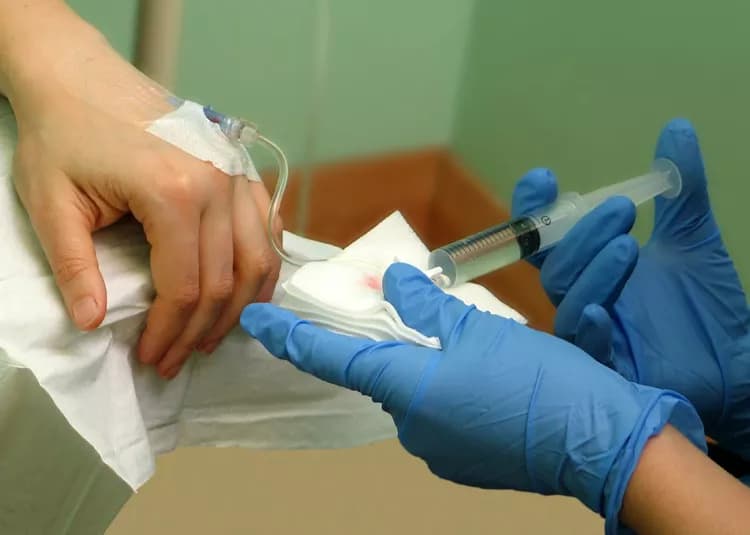
The Understudied Consequences Of Peripheral Neuropathy After Chemotherapy
In two papers published in the Journal of the National Cancer Institute researchers from UC Davis, UCLA and other institutions have found that peripheral neuropathy, which causes pain, numbness, and tingling in hands and/or feet, can bother early-stage breast cancer patients years after completing chemotherapy. In addition, a systematic literature review found only a handful of studies that tracked long-term peripheral neuropathy, leaving little data for patients and clinicians to make informed decisions.
"Until recently, the really strong focus has been to identify treatments to reduce breast cancer recurrence and mortality," said Joy Melnikow, a co-author who directs the Center for Healthcare Policy and Research at UC Davis. "I think we've reached the point now where we need to ask questions about the adverse effects that come along after curative treatments. We need to balance what are sometimes small therapeutic benefits with the risk of long-term adverse events."
To understand how neuropathy affects breast cancer patients one or more years after treatment, the researchers began with a systematic review of peripheral neuropathy literature. They found only five papers on studies that followed patients for a year or more. In addition, the research produced widely variable results.
"The most striking finding from the review was how little data was out there," Melnikow said. "And these studies report a wide range of frequency for peripheral neuropathy, from as low as 11 percent to more than 80 percent of patients at one to three years after treatment."
The second study was launched to help remedy this scarcity of information. The team looked at 1,512 early-stage breast cancer patients from the National Surgical Adjuvant Breast and Bowel Project Protocol B-30 (NSABP B-30), a large clinical trial that investigated the effectiveness of various combinations of doxorubicin, cyclophosphamide, and docetaxel, all chemotherapies.
The team mined the NSABP B-30 data to examine how these different combinations influence long-term peripheral neuropathy. Overall, two years after the start of treatment, 42 percent of patients experienced neuropathy symptoms and 10 percent reported severe discomfort. In addition, women experiencing more severe neuropathy symptoms reported much worse quality of life.
These findings may help clinicians optimize treatment to reduce the risk of long-term neuropathy. For example, patients who received the lower-dose docetaxel combinations were less affected by long-term neuropathy. Also, women who had pre-existing neuropathy symptoms before starting cancer treatment, were older and more obese, fared much worse.
Oncologists have encouraged patients to receive adjuvant chemotherapy to guard against breast cancer recurrence. However, given the potential for side effects, and the effectiveness of other treatments, the authors concluded that the choice of adjuvant chemotherapy drugs or their avoidance should include consideration of long-term effects of breast-cancer treatment.
"There is very little treatment for neuropathy, and there's nothing that's actually proven to work," said Patricia Ganz, director of the Center for Cancer Prevention & Control Research at UCLA's Jonsson Comprehensive Cancer Center and senior author on the NSABP B-30 paper. "Since we don't have an effective treatment, ideally it would be best to prevent it from happening by not administering chemotherapy if it is likely to have minimal additional benefit. Alternatively, this class of drugs could be avoided in patients who are at higher risk for persistent neuropathy. At the minimum, patients need to be informed about the likelihood of persistent symptoms."
Ultimately, these studies raise questions that the present data cannot answer. The authors encourage the research community to study peripheral neuropathy and other chemotherapy side effects to understand which treatments can eradicate cancer without generating long-term discomfort and reduced quality of life. In addition, researchers need to develop more consistent metrics to better compare results across studies.
"This is a call to action," said Melnikow. "We can't definitively define the frequency of peripheral neuropathy or understand the differences between chemotherapy regimens with the data we have. This issue of adverse effects in survivors goes beyond peripheral neuropathy. There are other effects that need to be considered while women are making treatment decisions."
Materials provided by UC Davis Comprehensive Cancer Center. Note: Content may be edited for style and length.
Disclaimer: DoveMed is not responsible for the accuracy of the adapted version of news releases posted to DoveMed by contributing universities and institutions.
References:
- Donna R. Rivera, Patricia A. Ganz, Meghan S. Weyrich, Hanna Bandos, Joy Melnikow. (2017). Chemotherapy-Associated Peripheral Neuropathy in Patients With Early-Stage Breast Cancer: A Systematic Review. JNCI: Journal of the National Cancer Institute. DOI: 10.1093/jnci/djx140
- Hanna Bandos, Joy Melnikow, Donna R. Rivera, Sandra M. Swain, Keren Sturtz, Louis Fehrenbacher, James L. Wade, Adam M. Brufsky, Thomas B. Julian, Richard G. Margolese, Edward C. McCarron, Patricia A. Ganz. (2017). Long-term Peripheral Neuropathy in Breast Cancer Patients Treated With Adjuvant Chemotherapy: NRG Oncology/NSABP B-30. JNCI: Journal of the National Cancer Institute. DOI: 10.1093/jnci/djx162
Related Articles
Test Your Knowledge
Asked by users
Related Centers
Related Specialties
Related Physicians
Related Procedures
Related Resources
Join DoveHubs
and connect with fellow professionals

0 Comments
Please log in to post a comment.